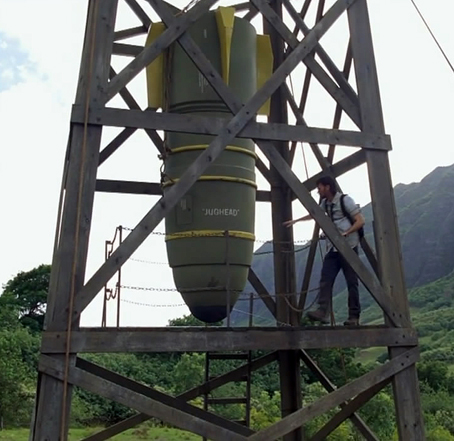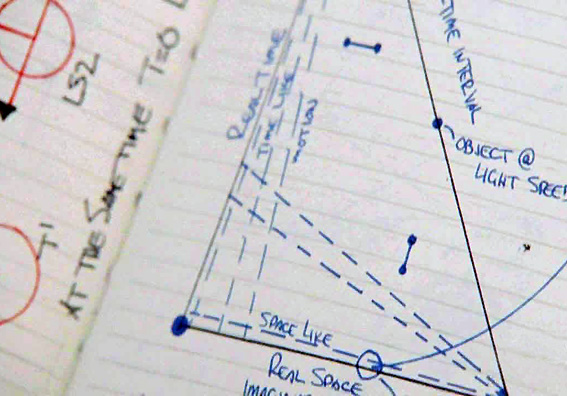
Daniel Faraday and Jughead
Lost Season 5: Jughead and The Little Prince
It’s almost starting to seem normal to have the A- and B-plots separated by thousands of miles, three years, and uncountable metaphysical planes.
Like a polar bear let loose from its training cage, the action continues to galumph in great strides in both LA and back on the island. The Island 6 are far more compelling than the adventures of the Oceanic 6, although the action in LA will certainly be interesting in retrospect and there are scattered moments of brilliance – particularly the evolution of Sun into corporate shark and vengeful assassin. Ben’s use of human chess pieces is always entertaining as well, especially now that the moves are revealed within the same episode.
(Who could be challenging Kate’s custody of the narcoleptic turniphead? Maybe we’ll find out by the end of the season or – oh, it’s Ben. Hmmm. Oh, oh, but his lawyer – what’s that guy’s story, huh? Is he Kelvin’s secret lovechild half-brother, or what? Ah Lost, never really answers it’s true mysteries…)
Still, these moments are rationed throughout the LA plotline, crammed in the spaces between plot gears. The island 6 are encountering nothing but great chunks of interesting backstory, and – in between being attacked and bewildered and nearly dead, which is any given day on the island – developing an almost warm group cohesion. Juliet abandons her self-imposed isolation to stabilise Sawyer’s shaky emotional state; John begins to explain his motivations, and their lack of solid evidence, rather than clinging to his deluded mystical-John Wayne image. Faraday jumps to protect the group – and Charlotte – from gun-toting hardliners with only his wits and scientific background. Sawyer – who 100 or so days ago was an amoral conman preying on fellow survivors – immediately launches a rescue ambush when he sees Faraday at gunpoint, berating John for looking out for his personal interests.
Even Miles asks for help when he admits he’s joined the nosebleed club.
No wonder I spend the LA times wanting to get back to the island, where the group is pulling together and investigating immediate mysteries, instead of going on with Lost’s business as usual – a loose collection of deeply flawed characters continually compromising their few principles, who each may or may not be plotting to kill the rest, with the world possibly at stake and not nearly enough information to make these decisions.
I’ll probably be fascinated by it in a few episodes, but for now…
Lost uses the interesting form of time travel, in which the timeline is resilient. Someone who goes back in time has always been there at that time, and unless they did a thing with a key and a magnetic field no one’s ever quite figured out, they can’t do a thing to change the future. Stomp on all the butterflies you want, kill all four grandparents, rip open the box with the alive-dead cat – none of it can change a thing. You were always there in the past and you always did exactly as you are going to do, as time and space are far too powerful to be inconvenienced by mere paradox.
This form still allows for character pitfalls. For instance, Faraday, confronted by a leaking hydrogen bomb, tells the 1950’s-era Others to simply bury it in cement and forget about it – after all, he knows the island didn’t blow up. His knowledge of the future makes him ignore its limitations. After all, in 2004 the bomb hasn’t gone off, but what about 2005? And what effect could the loose radiation from a shoddy containment job have had on the mysterious power course behind the donkey wheel? And, now that he knows there’s a powerful, if dangerous and unstable, weapon, will Faraday ever be tempted to dig it up to face off some seemingly greater threat?
There are also pitfalls of a bootstrap nature, the undermining of one’s personal (assumed) causality. John Locke is a particular demonstration of this. He grows up feeling there is some destiny he’s meant for that he’s always just failing to grasp. Arriving on a mystical island that heals his spine and gives him an outlet for his aborted Walkabout studies, then joining the locals as their leader, John feels he has finally achieved his true place. He is King of the Others for all of five minutes before he’s sent reeling into the past, given a compass that will somehow prove his identity (an item that seems trapped in its own closed time loop, eternally passing between John and Richard across fifty years). There he tells the (somewhat) younger Richard that he will be their leader in the future, casually giving them his upcoming birthdate and location before disappearing in a flash of light, leaving behind a prophesy. Based on this, the Others attempt to groom young John for leadership from a distance, eventually culminating in his five minutes in charge.
One mystery solved: does John Locke really have a mystical connection to the island? No. Does he have a destiny? Only the one he’s created for himself – always seeking leadership and validation, and always just overshooting it.
Thus, it’s really worrisome to discover that the origin of the ‘Return the O6 to the Island’ world-saver came from our Mr Locke.
Is it too late for him to embrace the advice of his high school guidance councillor and see if Faraday won’t take him on as an apprentice jack-of-all-sciences?
Where are Rose and Bernard, and, if alive, have they joined the nosebleed club as well?
What other sleeping time bombs lie Cthuhlu-like beneath the innocent jungle?
How did Jin not only survive but get caught up in the island’s time warp? Oh, I don’t even care. I’m just happy he made it. There’s nothing like a bitter vengeance arc undercut by the lost object’s inconvenient existence. This could fill the Desmond/Penny gap left by their reunion – lovers whose relationship is defined by absence, with enough remembered sweetness to leave viewers illogically anticipating an unlikely happy ending.
Not to mention – the poor fellow – he finally learns enough English to communicate with the rest of the group, and now is back in the situation of having only one other person who can understand him! And by the time he’s picked up enough French to ask for a drink of water, he’ll be lifted away to another group, probably one that only speaks Norwegian. By next season, he’ll be the island’s official interpreter.
Speaking of sweetness, there is Jin’s new friend: Danielle Rousseau, marooned with her research team. Assuming the actress’ availability, it would have been easy enough to youth-inize Mira Furlan by 16 years with little more than some conditioner and lip gloss. But with the new actress, Melissa Farman, the young Danielle’s softness and vulnerability is painfully obvious – her rounder face and sunless complexion, with a ready smile and unguarded expression. Furlan has been the paranoid and pared-down survivor from her first appearance – both crazy and hot, as I and everyone else with eyes have noted – and it does require the jolt of a different actress to illustrate the character’s change. Somehow this sweet young woman will have the inner strength – or psychotic break – to murder her dangerously ill teammates, give birth unassisted, and survive 16 years of constant warfare with those who know every inch of the Island.
I can’t wait to see how that happens.



